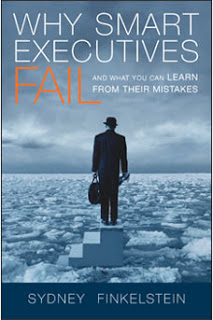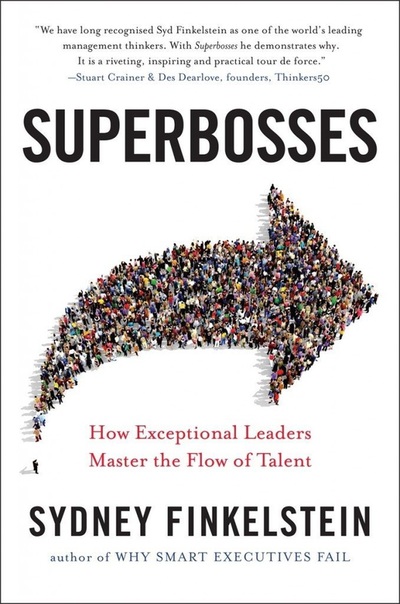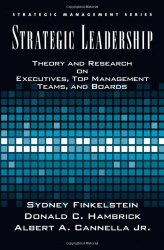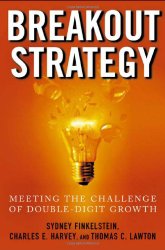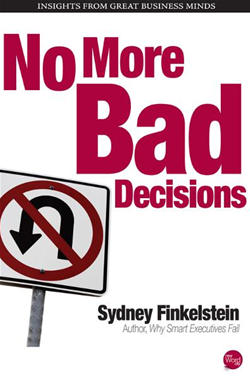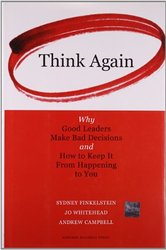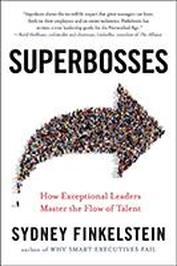Sydney Finkelstein Speaker Profile
Is the Steven Roth Professor of Management at the Tuck School at Dartmouth College, where he teaches courses on Leadership and Strategy. Professor Finkelstein also teaches executive education at the Tuck School (where he serves as the Faculty Director of the flagship Tuck Executive Program),
Sydney Finkelstein : Profile2017 Thinkers50 Ranking - 23 Sydney Finkelstein’s approach to leadership and strategy focuses on the strengths and weaknesses of executive talent. His widely read research analyzes how capable leaders make bad decisions and, ultimately, fail. Sydney Finkelstein is the Steven Roth Professor of Management, and Associate Dean for Executive Education, at the Tuck School of Business at Dartmouth College, where he teaches courses on Leadership and Strategy. He is the Faculty Director of the flagship Tuck Executive Program. Professor Finkelstein is a recognized thought leader on leadership, strategy, and corporate governance, and is listed in the “World’s Top 25 Leadership Gurus.” Sydney is listed in the Thinkers50 2017, the world's top ranking of management gurus. Professor Finkelstein has published 19 books with several bestsellers. His newest book is Superbosses: How Exceptional Leaders Master the Flow of Talent. After ten years of research and studying an incredibly diverse group of leaders such as restaurateur Alice Waters, fashion iconoclast Ralph Lauren, Oracle founder Larry Ellison, Sydney finds they all have one thing in common — they are legendary for spawning legions of protégés who have gone on to transform entire industries. Via stories and analysis, Superbosses describes what they do, and how they do it. His other books, include the #1 bestseller in the U.S. and Japan, Why Smart Executives Fail. Based on a six-year study of 51 companies and 200 interviews of business leaders, the book identifies the fundamental reasons why major mistakes happen, points out the early warning signals that are critical for investors and managers alike, and offers ideas on how organizations can develop a capability of learning from corporate mistakes. On Fortune Magazine’s list of Best Business Books, the Wall Street Journal called it “a marvel – a jargon-free business book based on serious research that offers genuine insights with clarity and sometimes even wit … It should be required reading not just for executives but for investors as well.” It has been translated into 11 different languages. In his follow-up book, Think Again: Why Good Leaders Make Bad Decisions and How to Keep it From Happening to You, he turned his attention to such major strategic decisions as the war in Iraq, Hurricane Katrina, and numerous business cases to explain why decision-makers sometimes think they’re right when they are really wrong. The book takes up recent research in neuroscience, cognitive psychology, and management to not only document why things go wrong, but also to offer a series of solutions that reduce our vulnerability to falling into the traps that lead to bad decisions. Professor Finkelstein is a Fellow of the Academy of Management, and has had three books nominated for the Academy of Management’s Terry Book Award, the most prestigious such honor in the field. His other awards include Finalist for the Academy of Management Executive Best Paper Award (2004), the McKinsey & Company Strategic Management Society Best Conference Paper Prize Honorable Mention (2002), the Best Paper Award from the Academy of Management Executive for his article “Leveraging Intellect” (1997), two Citations of Excellence from ANBAR, the world’s leading guide to management journal literature (1997 & 1998), the Cenafoni Prize for research in Entrepreneurial Strategy (1991), and finalist for the A.T. Kearney award for the best research in strategic management (1988). His latest bestselling book is Superbosses: How Exceptional Leaders Master the Flow of Talent, the result of a ten-year research project on some of the most intriguing business leaders in the world who all have one thing in common – they helped develop the best talent in their industry sectors, who in turn helped them become the legendary successes they are today. What they did, and how they did it, are shared via fascinating profiles and nine management practices that separate the best bosses from the merely good ones. As LinkedIn Chairman Reid Hoffman put it, Superbosses is “a leadership guide for the Networked Age.” He holds degrees from Concordia University and the London School of Economics, as well as a Ph.D. from Columbia University in strategic management. He is well known for his keynote speeches and television appearances, and is a columnist for the BBC. SYDNEY FINKELSTEIN : SUGGESTED SPEAKING TOPICS
| |||||
|
|
|
- Why Smart Executives Fail: And What You Can Learn from Their Mistakes. Hear a conversation with Professor Finkelstein
LEADERSHIP INSIGHTS VIDEOS
- Mickey Drexler, CEO of J. Crew
- Ernie Parizeau's Leadership Lessons in Venture Capital
- Rick Routhier on Talent Pickers
- Sydney Finkelstein with Eric Jackson
- Interview with Tom McInerney, CEO of Genworth
Best CEOs of 2013. Click here.
Worst CEOs of 2013. Click here.
Professor Finkelstein has created a new iTunes “album” with podcasts based on his BBC column “Syd Weighs In.” As he describes the podcasts, “With a guest host, we go beyond the column and have a good chat about the issues. The most recent one uses the Sochi Olympics as a springboard for a discussion on what competition is and what “type” of competitive mindset is actually the most effective. My guest host in this instance is a former member of the US Olympic ski team.” Access here.
Secrets of the SuperbosseWhen you look at the top people in a given industry, you often find that many of them once worked for the same well-known leader. In the NFL, 20 of 32 head coaches trained under Bill Walsh or someone in his coaching tree. Dozens of top hedge fund managers got their start under Julian Robertson of Tiger Management. Nine of Larry Ellison’s top execs became CEOs, COOs, or chairs of other companies. The list goes on: Jay Chiat, Alice Waters, Bob Noyce, Lorne Michaels, and Mary Kay Ash are all known for grooming extraordinary people who became leaders in their fields.
After conducting deep research into the practices of these superbosses, Tuck professor Finkelstein found similarities in their “people strategies.” In hiring, they focus on intelligence, creativity, and flexibility; look for unconventional talent; and adapt roles and even organizations to suit people. In development, they set high expectations, build master-apprentice relationships, and encourage fast, step-change growth. All of us can borrow from their playbook to improve our own ability to identify and hone talent.
After conducting deep research into the practices of these superbosses, Tuck professor Finkelstein found similarities in their “people strategies.” In hiring, they focus on intelligence, creativity, and flexibility; look for unconventional talent; and adapt roles and even organizations to suit people. In development, they set high expectations, build master-apprentice relationships, and encourage fast, step-change growth. All of us can borrow from their playbook to improve our own ability to identify and hone talent.
| secrets_of_the_superbosses.pdf |

